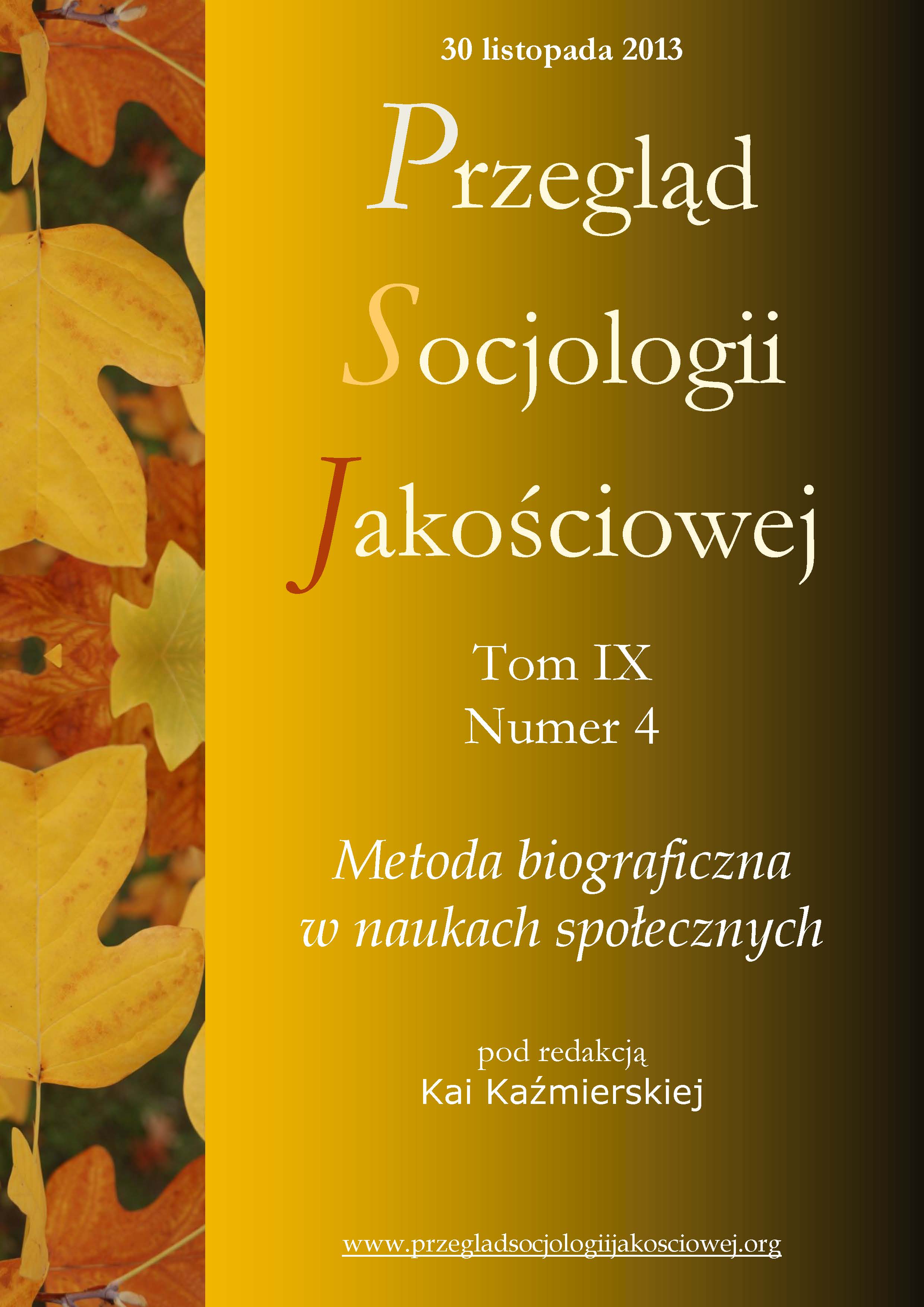Polish Researcher in Ukraine: Methodological Remarks
DOI:
https://doi.org/10.18778/1733-8069.9.4.09Keywords:
biographical-narrative interview, qualitative research, biographical memory, analysis of the narrative, Polish-Ukrainian relations, Word War IIAbstract
The aim of the article is to analyze methodological aspects of implementing research project in a culturally different environment where language and national identity difference between interviewee and interviewer is present. The analysis is based on the fieldwork done by the Polish researcher in Ukraine. I try to answer whether different nationality influences in such situation the interaction with the interviewees and the results of the research, whether it is a burden or an advantage, and how this possible influence can be controlled. I am interested in issues of contact with the interviewees and interaction during the interview as such, as well as various kinds of the narrative’s modification made by the interviewee because of the different nationality of the researcher. I illustrate the following problems with citations of the interviews conducted within the frame of the project.
Downloads
References
Babiński Grzegorz (2004) Metodologia a rzeczywistość społeczna. Dylematy badań etnicznych. Kraków: Zakład Wydawniczy Nomos.
Google Scholar
Dyczok Marta (2000) The Grand Alliance and Ukrainian Refugees. New York: St. Martin’s Press.
Google Scholar
DOI: https://doi.org/10.1057/9780230596498
Filipkowski Piotr (2006) Historia mówiona i wojna [w:] Sławomir Buryła, Paweł Rodak, red., Wojna. Doświadczenie i zapis – nowe źródła, problemy, metody badawcze. Kraków: Universitas, s. 13–36.
Google Scholar
Filipkowski Piotr (2010) Historia mówiona i wojna: doświadczenie obozu koncentracyjnego w perspektywie narracji biograficznych. Wrocław: Wydawnictwo Uniwersytetu Wrocławskiego.
Google Scholar
Hrynewycz Władysław (2005) Mit wijny ta wijna mitiw. „Krytyka”, nr 5 (91), s. 2–8.
Google Scholar
Inowlocki Lena (1993) Grandmothers, Mothers and Daughters. Intergenerational Transmission in Displaced Families in Three Jewish Communities. “International Yearbook of Oral History and Life Stories”, t. 2, Daniel Bertaux i Paul Thompson, eds., Between Generations. Family Models, Myths and Memories. Oxford University Press, s. 139–154.
Google Scholar
DOI: https://doi.org/10.4324/9781351314084-9
Kaźmierska Kaja (1996) Wywiad narracyjny – technika i pojęcie analityczne [w:] Marek Czyżewski, Andrzej Piotrowski, Alicja Rokuszewska-Pawełek, red., Biografia a tożsamość narodowa. Łódź: Wydawnictwo UŁ, s. 35–45.
Google Scholar
Kaźmierska Kaja (2008) Biografia i pamięć. Na przykładzie pokoleniowego doświadczenia ocalonych z Zagłady. Kraków: Nomos.
Google Scholar
Kaźmierska Kaja (2012) Wprowadzenie [w:] taż, red., Metoda biograficzna w socjologii. Antologia tekstów. Kraków: Wydawnictwo Nomos, s. 17–31.
Google Scholar
Konieczna Joanna (2001) Polska – Ukraina: wzajemny wizerunek. Warszawa: Instytut Spraw Publicznych.
Google Scholar
Marples David R. (2008) Heroes and Villains. Creating National History in Contemporary Ukraine. Budapest: New York: Central European University Press.
Google Scholar
Nijakowski Lech M. (2006) Domeny symboliczne. Konflikty narodowe i etniczne w wymiarze symbolicznym. Warszawa: Wydawnictwo Naukowe Scholar.
Google Scholar
Nowak Jacek (2011) Społeczne reguły pamiętania. Antropologia pamięci zbiorowej. Kraków: Wydawnictwo Nomos.
Google Scholar
Riemann Gerhard, Schütze Fritz (1992) „Trajektoria” jako podstawowa koncepcja teoretyczna w analizach cierpienia i bezładnych procesów społecznych. „Kultura i Społeczeństwo”, t. 36, nr 2, s. 89–111.
Google Scholar
Rokuszewska-Pawełek Alicja (2002) Chaos i przymus. Trajektorie wojenne Polaków – analiza biograficzna. Łódź: Wydawnictwo Uniwersytetu Łódzkiego.
Google Scholar
Rosenthal Gabriele, Bar-On Daniel (1992) A Biographical Case Study of Victimizer’s Daughter’s Strategy: Pseudo-Identification with the Victims of Holocaust. „Journal of Narrative and Life History”, nr 2, s. 105–127.
Google Scholar
DOI: https://doi.org/10.1075/jnlh.2.2.02bio
Rosenthal Gabriele, red., (2010) The Holocaust in Three Generations. Families of Victims and Perpetrators of the Nazi Regime. Opladen & Farmington Hills: Barbara Budrich Publishers.
Google Scholar
DOI: https://doi.org/10.2307/j.ctvddzxt6
Szacka Barbara (2006) Czas przeszły, pamięć, mit. Warszawa: Wydawnictwo Naukowe „Scholar”.
Google Scholar
Tschuggnall Karoline, Welzer Harald (2002) Rewriting Memories: Family Recollections of the National Socialist Past in Germany. „Culture Psychology”, nr 8, s. 130–145.
Google Scholar
DOI: https://doi.org/10.1177/1354067X02008001625
Wojakowski Dariusz (2002) Polacy i Ukraińcy: rzecz o pluralizmie i tożsamości na pograniczu. Kraków: Zakład Wydawniczy Nomos.
Google Scholar
Wyka Anna (1993) Badacz społeczny wobec doświadczenia. Warszawa: Wydawnictwo IFiS PAN.
Google Scholar
Zowczak Magdalena, red., (2010) Na pograniczu „nowej Europy”. Polsko-ukraińskie sąsiedztwo. Warszawa: Wydawnictwo DIG i IEiAK UW.
Google Scholar
Zowczak Magdalena, Smyrski Łukasz, red., (2003) Podole i Wołyń. Szkice etnograficzne. Warszawa: Wydawnictwo DIG i IEiAK UW.
Google Scholar
Downloads
Published
How to Cite
Issue
Section
License

This work is licensed under a Creative Commons Attribution-NonCommercial-NoDerivatives 4.0 International License.














